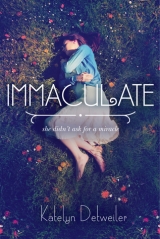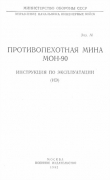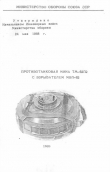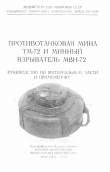
Текст книги "Immaculate"
Автор книги: Katelyn Detweiler
сообщить о нарушении
Текущая страница: 14 (всего у книги 21 страниц)
“I get it. Don’t worry, really. I get it. Let’s just pretend that never happened, okay? It’s cold out and you don’t have a jacket, so you should get back inside, anyway.” He gave a small wave and tugged his hood up as he jogged toward the truck.
A nauseating swell of regret made me want to call out after him, but I pushed it back down. I would have to erase that kiss from my mind. An eighteen-year-old single mom didn’t have time for romance and all the complications that came along with a relationship. Especially not when she had an angry mob of strangers to deal with first and foremost.
Jesse would understand. Jesse would move on.
And hopefully, someday, I would, too.
the third trimester


Ten days.
Ten flaps left to open on the Advent calendar hanging on the kitchen wall.
Ten more pieces of star-shaped chocolates to pop out of the ten remaining small windows that opened into the cozy winter village scene—round puffs of smoke rising from the chimneys, bundled-up carolers open-mouthed on front stoops and grinning children peeking from behind curtains, a glowing tree in the center town square.
Ten days before Christmas and then maybe, just maybe, life could get a little bit easier. Not surprisingly, the whole “pregnant virgin” story seemed especially popular during the holiday season. But soon it would be a new year, with its own new stories. People disappeared come January. Crawled back into their own little houses and their own little lives and didn’t poke their heads out into the fresh air again until the first early spring breeze come late March. And by late March, I wouldn’t be a pregnant virgin anymore. I would be a mother, and maybe at some point the media and all the thousands of people who couldn’t get enough of Virgin Mina would become bored. They wouldn’t forget—the story, the idea, the image of my face would still linger in their minds, a memorable curiosity to turn over through the years, to pull out occasionally when dinner conversations became entirely exhausted—but I would no longer be a subject for prime-time TV. Reporters would run out of angles, the story would be flat and stale. The well would run dry.
And then I would get my life back.
The house phone started ringing, and two chimes in I remembered that I was home alone and that no one else would be answering. My parents and Gracie were Christmas shopping at the mall, but after the news broke, I’d stopped going most public places other than school, really. Shopping online might lack Santa’s village and twinkling greenery, but it also lacked gawking moms and wide-eyed kids without filters—kids like the boy last week who stopped me at the grocery store and asked how I knew that my baby wouldn’t be a flesh-eating alien who could eat its way straight out of my belly. Oh yes, online shopping would most definitely do just fine.
I’d left my job at Frankie’s behind, too, in the aftermath. It was hard to put an end to the income flow, but it had all become too much—the stares, both real and imagined, and the religious imagery plastered all along the walls. It wasn’t only the eyes of the customers I could feel tracing my movements around the room. The life-size Madonna portrait was like the Mona Lisa, her gaze pinning me down no matter where I stood. And besides that, the need I’d had to stay connected to Iris, to catch her again on that off chance—it felt less confined to Frankie’s now, after that moment in the cafeteria. Maybe she was just as likely to show up anywhere at all. Maybe she’d know where to find me no matter where I went.
I sighed as I pushed myself up from the kitchen table, where I’d been flipping mindlessly through a special new mothers magazine Hannah had picked up for me at the pharmacy. My mom was still collecting last-minute RVSPs for a holiday party that she was holding at the historical society the next week, and I felt guilty ignoring a call from any of the sweet old ladies who generally attended my mom’s events.
I grabbed for the phone right before the answering machine could click on.
“Hello?”
“I’d like to speak to Mina Dietrich, please.” The voice was high-pitched and booming, and I detected at least a slight Southern accent in those first few words.
“Mina speaking. And this is . . . ?”
“Gladys from Richmond. Richmond, Virginia.”
“Hi, Gladys from Richmond. Can I . . . can I help you with something?”
“I’m just calling to tell you that I think it’s downright disturbing, this blasphemous black Devil lie you keep on spreading around our God-fearing country. During the very season of Our Lord, nonetheless! You ought to be so powerfully ashamed of yourself. And your parents! I don’t know how your parents sleep a wink at night.”
My blood chilled, froze solid like tiny piercing crystals of ice lodged in my veins. She might have been hundreds of miles away, but her voice, coming from the phone in my kitchen—my family’s very own kitchen, our safe haven—made me feel completely violated.
“How did you get my number?”
“Well, I’m sure I could have found it in the phone listings on my own if I’d tried, but as it is, it was just posted on the Internet this morning. It was the latest post on that Virgin Mina website that everyone’s been talking about. They’re encouraging people to speak out directly—you know, have a real dialogue with you about our thoughts.”
“Your thoughts?” I hissed into the phone. “I don’t know you. You don’t know me. You’re not entitled to call me in my own home with your thoughts about my life.”
She snorted, a sort of harrumph sound, and then continued. “I saw that piddly fluff ball of an interview you did for KBC last week, and let me tell you, it was obvious from where I was sitting that you really have nothing to say for yourself. ‘I can’t explain how this happened,’” she quoted, her voice taking on a nasally, offensive edge as she attempted to imitate me, “‘but no, I’m not claiming to be God’s chosen either. I’m just trying to do the right thing.’ Because that’s just plain old nonsense. If you knew—if you really knew with every fiber of your being, your soul—that you were innocent, then how could this be anything but a miracle? How could you be anything but chosen? But you won’t say either of those things because you know that you’re lying, and I suppose it’s good to see that you at least have enough decency to close your mouth when it comes to the most sacred claims. Mind you, I still think you’ll be going straight to the Devil if you keep up with the path you’re on now, and . . .”
I hung up and threw the phone down onto the counter, watched as it skittered and spun in precarious circles edging closer and closer to the sink. Good. Let it get ruined. Let me be inaccessible to the whole world of strangers who now had our number, just in case they wanted to “dialogue” with me this morning, tonight, tomorrow, whenever they so desired. I edged my back along the cabinets as I sank to the floor and buried my head in my hands. Her patronizing tone still rattled in my ears, making my whole body shake.
She was right. The KBC interview I’d agreed to last week had been a joke. A totally insubstantial, useless filler story that did little if nothing to help my case. I blushed, stuttered, rambled about my good grades and my regular church attendance while my hyperdilated eyes darted everywhere but at the camera or the reporter sitting across from me on our living room sofa. Based on the feedback I saw on the website after the report first aired—and again after the reposting of the video online—the majority of viewers concluded that the nervous tics more than proved my guilty conscience. Only a few outsiders suggested I was endearingly confused, crazy and delusional rather than an outright pathological liar.
“You’ll just have to do better next time,” my dad had said under his breath, all of us gathered in front of the TV, stone-faced and hushed, for the first prime-time viewing. So far, I hadn’t let there be a next time, despite the daily flood of new requests. One failed attempt was enough to convince me that there was nothing I could say to change the public opinion. My story was weak. There were no facts. There were no theories. I had no supporting evidence, no photographic proof, no witnesses other than Jesse, and I refused to let him burn under the spotlight next to me.
But as I played over Gladys from Richmond’s call, I was most upset, I realized, by her claim that if I was so certain, if I was so absolutely positive that this baby had come about by nothing short of divine intervention, than I would be claiming my “chosen” status with pride and courage. That there could be no room for uncertainty.
But how could I know—how could anyone in the world know—that miracles were, by necessity and without a doubt, the plan, the doing, the sign of God? Of a god, of any god? And if so, which god? Whose god? Last I checked, there was more than just one perception of God, so why should I assume that this was the work of the same god as in my Bible? The god I learned about in Sunday School and the god who almost everyone in Green Hill considered to be the “true God”—the “one and only God.”
Perhaps there were miracles outside of the church. Miracles outside of any realm that we knew, and outside of any logic system that we as mere humans could even begin to wrap our heads around. I was starting to think that ancient cultures—the Maya, Celtics, Egyptians, Buddhists, Native Americans—had a much more sensible view of the way things worked, the divinity to be found in nature, the world all around us, the sun, the moon, the trees, the changing of seasons and the forces of weather.
“Miracles are not contrary to nature, but only contrary to what we know about nature.”
It was a line I’d stumbled across over and over during my online scouring for miracles, a quote from Saint Augustine of Hippo, born in the fourth century, a Latin philosopher and theologian from the African Province of the Roman Empire often considered to be one of the greatest Christian thinkers of all time. I had researched him afterward, excited that he had so eloquently summed up my own thoughts—my hopes that there was more to nature and its phenomenal possibilities than met the eye—but I didn’t see much else in his writings that I agreed with or could absorb as my own belief system. But I still had this one quote, this sentiment of faith, a new perspective for the kind of miracle I was experiencing in my here and now.
And I needed that, desperately. Needed something to cling to, nails dug deeply in, no matter how insubstantial or removed the idea might be. It’s not as if Iris had outlined the greater scheme to me. There was no name-dropping, no finger pointing to who exactly was calling the shots or if “they” had any concrete plans for the baby once he or she was walking, breathing, living on planet Earth alongside me. After nearly seven months of pregnancy, I still hadn’t come to many conclusions. What I knew, or thought I knew, to be true on some inner, metaphysical level, came to a very short list: This, this baby, this asexual form of reproduction, was an inexplicable, unprecedented scientific phenomenon. It was the work of some power—some much, much higher power—beyond our limited understanding as the insignificant peons temporarily wandering around this planet. For reasons that were entirely undecipherable to me, I was the person who would bring this mysterious creation into life.
And I would care for this creation, protect and love this baby, for the rest of my life, regardless of whether or not I ever came any closer to understanding the heart of it all: why?
Why, why, why?
One syllable, three letters, yet it still had more power over me than any other word I’d ever known. I’d always been the type of person who needed answers, which is probably why I’d been such a naturally good student. Teachers asked questions, and I’d study until I could answer them. But then came this question, the biggest question of my life, and I would probably never have an explanation, any real sort of resolution. My own sort of, kind of, innate and intuitive answers would have to be good enough. Somebody or something was clearly trying to teach me a lesson.
There was no perfect answer. Just like there was no perfect way to live.
I had tried, after all, for almost eighteen years. And now, with more ups and downs and unexpected loops than in the rest of my life combined, I somehow, oddly, felt more alive than ever.
The phone rang again from the counter and I held my breath, counting the rings as I waited for the answering machine to pop to life. Eight, nine, ten. Gracie’s sunny, giggly voice chirped from the speakers and made me feel even more alone. I needed the real Gracie. Hiyah! You’ve reached the Dietrich house! We’re not around to talk right now, so pretty please leave us a message. Bye!
“This is Elliot Ste—err—Elliot S from Ohio.” He spoke in a hurried, breathy whisper, his words smeared through the speakers from holding the phone too close to his anxious lips. “I’m calling for Mina. I wanted to say that it’s not too late to be forgiven. Not quite yet, not without one last warning. Come clean with the Lord and let Him back into your life. Open your heart to God, and let Him wash away this blackness from your soul. Acknowledge your sins to your family, to yourself, and to your country. You’re on a very dark and dangerous path, Mina Dietrich. And if you don’t repent soon, if you don’t admit to your Devil’s lies, then you deserve to be punished. I know where you live. We all do. And we’ll find you, Mina. If you don’t stop on your own, then we’ll find a way to stop you.” He finished with a flourish, breathing into the phone raggedly for a moment before the machine finally beeped and fell back into silence.
Within seconds the phone wailed at me again, and I pushed myself up to stand, arms reaching toward the shiny silver base mounted on the wall. I grasped at it with both hands, tearing it from the wall with a loud snapping of plastic brackets, and slammed it down against the floor. It slid against the tiles and I chased it, my feet, my legs, my entire body burning with the need to see it smashed into as many pieces as possible. I jumped on top of it, stomped again, right foot, left foot, kicked it against the bricks that lined our pantry and watched a spray of plastic chips fly into the air with an ecstatic sense of satisfaction. I lunged again, sending the machine rocketing toward the kitchen table. I was so focused that I didn’t hear myself screaming, didn’t hear the front door click open or the sound of my family’s footsteps pounding down the front hallway.
“What the hell, Mina?” my dad shouted, running at me and wrapping his arms around my shoulders and my chest, lifting me up so that my feet dangled above the ground. “What are you doing? What the hell do you think you’re doing?”
He spun me around and I saw my mom and Gracie, slack-jawed and cowering by the door, Gracie’s face half hidden as she pressed against my mom’s puffy winter jacket.
“I’m sorry,” I said, my eyes meeting Gracie’s in apology. I swallowed my terror, willed Elliot S’s cold, brittle words from my head. I didn’t want to add even more fuel to her fears. I didn’t want her to know how right she probably was to be afraid. “I didn’t mean to get so . . . so violent. But people are calling me, and I just couldn’t hear one more ring right now. I just couldn’t.” Dad’s stiff hold softened. My feet hit the ground, but he kept his arms around me. I breathed in the smell of him, the scent that I realized just now how much I’d missed—cool evergreen pine and spicy clove that somehow clung to his sweaters and T-shirts for days after he’d worn them. I inhaled again, savoring the closeness. I felt protected. Shielded from everything that lay beyond our front door.
“Who?” he demanded. “Who’s been calling you?”
“Strangers.” The word felt frigid, grim when I heard it on my lips. “Our number was listed on the website, apparently.”
At that, I heard a distant, muffled ringing—the phones in my dad’s office, my parents’ bedroom. I hadn’t even thought about the other extentions, I’d been so caught up in my fury. But I wasn’t inaccessable, not even close. It would take much more than annihilating a single phone to actually cut myself off from the rest of the world.
“Damn it,” my dad snapped, his arms dropping to his sides. I shivered, suddenly cold without the comforting warmth of his hold. “I knew this would happen. I knew it.”
“What do we do now?” my mom asked, her face as pale as the stark white fur lining her hood.
“I’m calling the phone company and finding a way to block or change our number. And then I’m calling the police, because this is harassment and I refuse to let these ignorant sons of bitches invade our family home.” My dad ducked his head and started for the hallway, boots stomping across the tiles. But then he turned back to face me, an afterthought, his eyes burning into mine so fiercely, I had to fight not to look away.
“Let me say this. I may still not know what to believe here, Mina, and I’m well aware that I haven’t been one of your biggest supporters. But I would never—never—do to anyone what these people are doing to you right now. I would never force my religious opinions on a complete stranger. I would never disrespect another family’s right to privacy. Because from where I’m standing, these people are committing much graver sins of their own, casting judgment on you like they have the authority. Acting like they have the right to make God’s own decisions. I won’t stand for it, Mina. I won’t.” With that he started back down the hall, his footsteps dying out with the slam of his office door.
“Can I go on the news for you, Meen?” Gracie asked, pulling me over to sit with her at the kitchen table. “Maybe they’ll believe you if I tell them all what a good sister you are. I’ll tell them that your eyebrows always get all funny and squiggly when you lie to me about something, and that’s how I know you’re not lying about this.”
I laughed, though I stopped myself after I saw the look of hurt on Gracie’s stoic face. “That’s very sweet of you, Gracie, but they’ll probably just think I brainwashed or blackmailed you. Honestly, I’m not sure there’s anything that any of us could say to change their minds.”
“You could tell them about Iris,” my mom said, her voice wavering and paper thin, like I could poke right through it if I so much as lifted my finger. “You didn’t say anything about her at all in the KBC interview. The way you told it to the reporter, you more or less woke up one day with all the standard pregnancy signs. Poof. Not pregnant one day, pregnant the next. Maybe people need to hear that there was something—some event, no matter how vague and inexplicable—that was the catalyst for all this. Iris was your Gabriel, Mina. That conversation was your own kind of Annunciation, as insane and sacrilegious as that sounds. And I think that’s what people want to hear. That’s what people need to hear.”
“Let me get this straight,” I said, trying my best to keep the words flat and even. “You think people are more likely to believe me if I say that an odd old lady came into the local pizza shop and told me I’d be having a baby?”
“I’m not saying that everyone will believe you, Mina.” She sighed. “I’m not even saying that most people will believe you. But I think that there are people out there, people who want to find something to believe in. Anything, some sign that there’s more to life than we have right here in our mundane and predictable day-to-day existence. Maybe if you say it, tell them all about Iris, maybe, just maybe, a few people will stop and think. Some small piece of them, buried somewhere beneath all the cynicism we’re trained to carry around from the time we’re supposed to know better, will hear what you’re saying. Will open up to you, to the idea that there may not be a black-and-white explanation.”
“And if they think I’m just crazy?”
“Then they think you’re crazy. They’re already hell-bent against you, Mina. The way I see it, a few desperately hopeful people switching over to your court is better than nothing. We can use whoever we can get on our side.” Her voice was getting stronger, the argument in her mind fully clicking into place as she put it into words out loud. “And there are decent people out there, too, people who still may not believe a word you’re saying but will believe in your personal right to say it without getting attacked by the media and the country’s conservative zealots. You need to face the camera and pour it all out, Mina, let America see that you’re not holding anything back anymore. Let them know what this is really doing to your everyday life.”
“So you think I should have cameras follow me around all day? Some sort of warped teen pregnancy documentary?”
“I wasn’t thinking of it quite like that, no. I meant that you could verbally and metaphorically walk them through your day.” She paused, her thumb drawing tiny circles along her palm as she considered. “But maybe what you’re suggesting is a much better idea. Maybe if people see the real you, your life, you’ll be more humanized. Less of a publicity object and more of a normal teenage girl going through a very abnormal experience.”
“Nice idea in theory, Mom. But seriously, think about how the media tears people apart, scatters their shreds across the tabloids. I can’t trust a reporter to do me any favors. I was just a prop to KBC. They all have their own motives and their own angles, and the bigger the scandal, the better for them because that’s what their viewers want, right? They’d turn my life into a total joke. Any dignity I have left—and that’s assuming I have any left at all—goes straight out the window.”
“Maybe we don’t have the typical reporter film you then.”
“Meaning . . . ?”
“Jesse.”
“Jesse?”
“Yes, Jesse. You told me that he helps out with a film crew, right? And he had that camera glued to his hand on your birthday. Why not have him record some of the day to day? You at school, you at home, pull some other interviews together, and then we could talk about submitting it somewhere. If it feels right, that is, after we’ve all looked it over. At the very least it’ll give you practice talking on camera. You can trust him to show the real Mina. That’s what matters. That’s all that matters.”
“I don’t know.” Sweat was already prickling along the back of my neck just at the thought of it. I wasn’t sure what made me most nervous: the idea of Jesse observing my life so closely, observing me so closely, or the idea of sending the final project out to the public. Things had been different since my birthday—cooler and more polite. We were still friends, of course. He drove me to school and sat with me and Hannah at lunch. Jesse had promised me—had promised Iris—his support, and he wasn’t the type to break his word. But after that kiss . . .
“I have to think about it,” I said, not meeting her eyes.
“Of course. But I think having Jesse film you couldn’t hurt, even if we don’t end up sending it out or posting it anywhere. It might be good to have this period of your life recorded. It’s a special time, Mina. Strange and terrible at times, yes . . . but definitely still special.”








